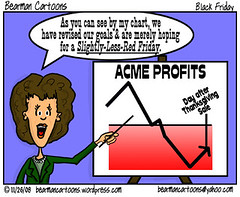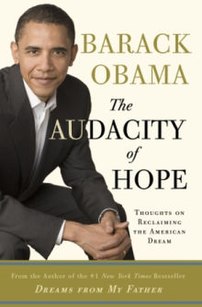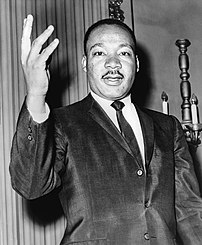 Image via Wikipedia
Image via WikipediaSunday, November 23, is the last day of the liturgical year -
Christ the King Sunday. Our Gospel describes the gathering of the nations at the end of time. The Son of Man separates one group from another, some to his right and the rest to his left. To those at his right he says: “Come, you that are blessed by my Father, inherit the kingdom prepared for you from the foundation of the world; for I was hungry and you gave me food, I was thirsty and you gave me something to drink, I was a stranger and you welcomed me, I was naked and you gave me clothing, I was sick and you took care of me, I was in prison and you visited me.”
I can just imagine the confusion of these people. “What is he talking about? We did not do anything for him. We just went about our business, helping those around us, doing what we could to make the world a better place.” Therefore, they ask
Jesus, “When did we do these things?” Jesus replies, “Just as you did it to one of the least of these who are members of my family, you did it to me.” Jesus continues by turning to those on his left. “Just as you did not do it to one of the least of these, you did not do it to me.”
Let us put all of this in perspective. Christ the King Sunday is the culmination of all that we have heard and learned about Jesus’ life and ministry. We expect triumph, a victory march, the final defeat of the forces of evil. What do we hear instead? We hear about Jesus’ compassion and his concern for the poor. We hear, unexpectedly, about how to participate in the Kingdom of God. Our passage says nothing about believing the right things, worshiping the correct way, or belonging to the right religion. Instead, it says that those qualified to participate are those who feed the poor, clothe the stranger, and care for the sick. How often we in the church find ourselves caught up in things of penultimate importance when God’s call is so clear.
The question is, how? How do we take care of the poor, the elderly, and the sick? We can serve meals at a soup kitchen, we can give turkeys for Thanksgiving baskets, and we can participate in mission trips – all very worthwhile ministries. We need to continue to do these things. There are other ways that we can take action as well, ways that will contribute to lasting, systemic change in our world.
As many of you know, in the year 2000 all 191 United Nations members pledged to meet the
Millennium Development Goals by 2015. The first of these eight goals is to eradicate world hunger and extreme
poverty by reducing in half the number of people living on less than one dollar a day and by reducing in half the proportion of people who suffer from hunger. Another goal is to halt and begin to reverse the spread of HIV/
AIDS, malaria, and other major diseases.
What happens at
the United Nations may seem very distant from
Newport, RI. However, we will never meet these goals unless we see them as our goals, unless we see them as a clarion call to action. Working to meet these goals is one of the ways that we can participate in God’s work, in feeding Jesus by feeding those whom he loves. It is one way to fulfill the promise that we make in the baptismal covenant to respect the dignity of every human being and to strive for justice and peace among all people.
Even with endless news coverage of global events, it is still difficult to think beyond our own lives, beyond our own little part of the world. Yet, if we are to take seriously the words of today’s Gospel, if we are to take seriously the baptismal promises that form the foundation of our faith commitment, then we cannot be satisfied as long as millions of people live in extreme poverty. Let me suggest some ways that you and I can act to make the Millennium Development Goals a reality.
First, explore and support the work of
Episcopal Relief and Development. In their words, they “address the United Nation's Millennium Development Goals through (their) food security and primary health programs, and (they) offer long-term solutions to help people sustain safer, healthier, and more productive lives.” This great organization belongs to us. It represents us throughout the world. Supporting it is one way that we can feed Jesus by feeding the poor.
Second, join the
Episcopal Public Policy Network. The Network “represents to our nations lawmakers the social policies of the church established by the General Convention and Executive Council, including issues of international peace and justice,
human rights, immigration, welfare, poverty, hunger, health care, violence, civil rights, the environment, racism and issues involving women and children.” If you join the network, you can participate in advocacy work, communicating with congressional representatives who you elected to make decisions that directly affect the plight of the poor in our country.
Three, check out
ONE: The Campaign to Make Poverty History. ONE is an effort of Americans to rally Americans – ONE by ONE – to fight the emergency of global AIDS and extreme poverty. ONE calls on Americans to alleviate the suffering of more than one billion people throughout the world who struggle to survive on less than $1 a day. I invite you to consider doing what over two million Americans have already done – sign the
ONE declaration: “WE BELIEVE that in the best American tradition of helping others help themselves, now is the time to join with other countries in a historic pact for compassion and justice to help the poorest people of the world overcome AIDS and extreme poverty. WE RECOGNIZE that a pact including such measures as fair trade, debt relief, fighting corruption, and directing an additional one percent of the U.S. budget toward meeting basic needs - education, health, clean water, food, and care for orphans - would transform the futures and hopes of an entire generation in the poorest countries. WE COMMIT ourselves - one person, one voice, one vote at a time - to make a better, safer world for all."
Finally, consider supporting
Bread for the World (or any of the other organizations listened in the “Favorite Links” section of this blog), one of the founding organizations of ONE. Bread for the World is a nationwide Christian movement seeking justice for the world's hungry people by lobbying our nation's decision makers. I have met several times with representatives of Bread for the World. They are looking for members churches to work on their behalf. I hope that at some point we will become one! It is just one more way that we as individuals and as a faith community can make a difference in our world.
We often take poverty for granted. We have become jaded, believing that we cannot change anything. Yet, we can. Not only can we, but I believe that it is an essential and necessary aspect of our commitment to live as disciples of Jesus. It is a Gospel imperative. On Christ the King Sunday, we celebrate the power of God to change lives, and the power of the human imagination that, inspired by God, can make a profound difference in the lives of people who suffer. I invite you to join me in doing your part, in doing our part, to make extreme poverty and suffering a relic of the past so that the words of today’s Gospel will come to fruition in our lives. Amen.
 Image by Bearman2007 via FlickrIts Black Friday, in recent years called by that name because it is the day that many retailers move into the black in terms of profit. I wonder for how many that will be the case this year.
Image by Bearman2007 via FlickrIts Black Friday, in recent years called by that name because it is the day that many retailers move into the black in terms of profit. I wonder for how many that will be the case this year. 
![Reblog this post [with Zemanta]](http://img.zemanta.com/reblog_e.png?x-id=b0a8f4dc-3ffa-4c42-92f5-2df55b04509a)

![Reblog this post [with Zemanta]](http://img.zemanta.com/reblog_e.png?x-id=274a9a1e-698a-43e4-9dd8-8b430b031c14)

![Reblog this post [with Zemanta]](http://img.zemanta.com/reblog_e.png?x-id=b3fd1ff7-58a9-449e-ac53-96de03128a4a)
![Reblog this post [with Zemanta]](http://img.zemanta.com/reblog_e.png?x-id=52c0ef5c-c5d0-4d6c-bc03-939e732651e2)
![Reblog this post [with Zemanta]](http://img.zemanta.com/reblog_e.png?x-id=78cb5493-77d4-41ed-9438-117dd27dd8ea)

![Reblog this post [with Zemanta]](http://img.zemanta.com/reblog_e.png?x-id=792571e3-4134-45ce-bc08-39ca85e8d767)

![Reblog this post [with Zemanta]](http://img.zemanta.com/reblog_e.png?x-id=44bbf2ab-d205-473e-a2d2-036a089b6138)

![Reblog this post [with Zemanta]](http://img.zemanta.com/reblog_e.png?x-id=ab9bfdaf-96b6-44c7-b028-a08127c47f7c)



